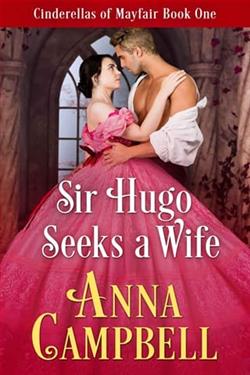
Sir Hugo Seeks a Wife
by Anna Campbell
A witty and sensual Regency romance as luscious as the treats from Sweet Little Nothings, Mayfair’s favorite bonbon shop.
Clever, independent Aphrodite de Smith earns a meager living, scratching out verses to accompany boxes of bonbons that gentlemen send to the ladies they’re courting. However lonely this life may be, it allows her to hide from her scandalous past. But what happens when one of those gentlemen decides that the poetess is a beauty ripe for wooing?
Forthright Yorkshire farmer Sir Hugo Brinsmead comes to London to find a bride among the beau monde. Except the woman who takes his fancy isn’t a society belle. Instead, she works at a fashionable sweet shop. Not to mention she’s as full of secrets as his broad acres are full of prize sheep.
Aphrodite might reject the handsome baronet’s proposals – for his own good! – but she can’t resist the searing desire that flares between them. When she offers Hugo a temporary affair, he agrees against his better judgment. He wants a wife, not a mistress. Yet even as their passion blazes, shadows from the past threaten their union. Can the gallant baronet convince his headstrong lady to defy the world and seize a happy ending?
.
Read
Sir Hugo Seeks a Wife on http://kissnovel.net
Martial Peak Reviews
Anna Campbell's Sir Hugo Seeks a Wife is a delightful foray into the world of Regency romance, where societal norms and personal desires often clash in the most intriguing ways. This novel stands out not only for its engaging narrative but also for its rich character development and exploration of themes such as identity, societal expectations, and the transformative power of love.
The story revolves around Aphrodite de Smith, a clever and independent woman who has carved out a niche for herself in the bustling world of Mayfair's Sweet Little Nothings bonbon shop. Her role as a poetess, crafting verses for the romantic gestures of others, is both a source of pride and a poignant reminder of her own solitary existence. Aphrodite's character is a refreshing departure from the typical Regency heroine. She is not a society belle but a woman with a past she wishes to keep hidden. Her independence and wit make her a compelling protagonist, and Campbell does an excellent job of fleshing out her complexities and vulnerabilities.
Enter Sir Hugo Brinsmead, a forthright Yorkshire farmer who is as far removed from the polished gentlemen of the ton as one can imagine. His quest for a bride brings him to London, but it is Aphrodite who captures his attention. Hugo's character is a breath of fresh air in the often-stifling world of Regency romance. His straightforwardness and sincerity are endearing, and his interactions with Aphrodite are filled with both humor and tension. The chemistry between the two is palpable, and Campbell skillfully navigates their evolving relationship with a deft hand.
One of the novel's strengths lies in its exploration of the theme of identity. Both Aphrodite and Hugo are characters who defy societal expectations in their own ways. Aphrodite's past is a shadow that looms over her, and her reluctance to embrace a future with Hugo is rooted in her fear of that past catching up with her. Hugo, on the other hand, is a man who knows what he wants and is unafraid to pursue it, even if it means challenging the norms of his social class. Their journey towards self-acceptance and mutual understanding is beautifully portrayed, and it is this journey that forms the emotional core of the novel.
Another theme that Campbell explores with nuance is the idea of love as a transformative force. Aphrodite and Hugo's relationship is not just about romance; it is about two people finding the courage to be true to themselves and to each other. The temporary affair that Aphrodite proposes is a turning point in the narrative, highlighting her internal conflict and desire for connection. Hugo's willingness to accept this arrangement, despite his own reservations, speaks to his deepening feelings for her. Their passion is intense, but it is the emotional intimacy that ultimately binds them together.
Campbell's writing is lush and evocative, capturing the essence of the Regency era while infusing it with a modern sensibility. Her attention to detail, particularly in the depiction of the bonbon shop and the vibrant world of Mayfair, adds depth and richness to the story. The dialogue is sharp and witty, reflecting the intelligence and humor of the characters. The pacing is well-balanced, with moments of tension and tenderness interspersed throughout the narrative.
In comparison to other Regency romances, such as those by Julia Quinn or Tessa Dare, Sir Hugo Seeks a Wife holds its own with its unique premise and strong character development. While Quinn often focuses on the intricacies of high society and Dare on the empowerment of her heroines, Campbell strikes a balance between the two, offering a story that is both romantic and thought-provoking. Her characters are not just players in a love story; they are individuals with depth and agency, navigating a world that often seeks to define them by their pasts or their social standing.
Overall, Sir Hugo Seeks a Wife is a captivating read that will appeal to fans of Regency romance and newcomers to the genre alike. Its blend of humor, passion, and emotional depth makes it a standout addition to Anna Campbell's body of work. The novel is a testament to the enduring appeal of love stories that challenge conventions and celebrate the power of love to heal and transform. For readers seeking a romance that is as sweet and satisfying as the bonbons of Sweet Little Nothings, this book is a delectable treat.
























Reviews 0
Post a Reviews: